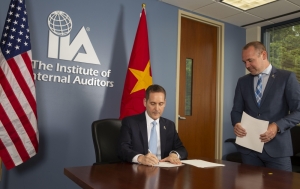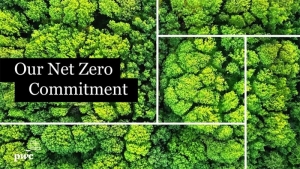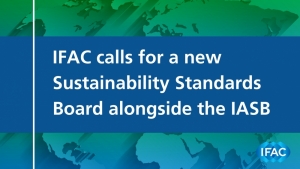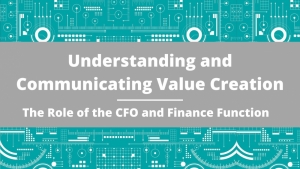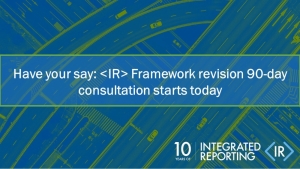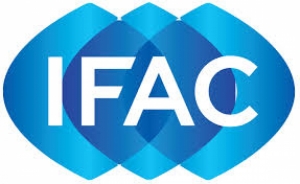عرض العناصر حسب علامة : المجلس الدولي للإبلاغ المتكامل IIRC
الخميس, 22 سبتمبر 2022 08:35
تركيز المدققين على المخاطر البيئية والاجتماعية وحوكمة الشركات
معلومات إضافية
-
المحتوى بالإنجليزية
Auditors focusing more on ESG risks
As companies come under increasing pressure to deal with climate change and diversity, their internal auditors are putting more emphasis on making sure environmental, social and governance reports are reliable.
A new report released Wednesday by the Institute of Internal Auditors explains some of the challenges involved with providing assurance on ESG and sustainability reports and understanding the risks of climate change and lack of diversity for a company’s operations.
More organizations are facing pressure from environmental groups, activist shareholders and asset managers to make public commitments to sustainability and provide regular updates on their ESG strategies, goals and measurements, while making sure they’re accurate and relevant. However, the report points out that ESG reporting is still at an immature stage, and there’s no single authoritative set of standards for what should be reported, although a number of groups have been moving in recent months to align their standards and frameworks. The internal audit function can help management by providing assurance, insights and advice on ESG matters, as some outside auditing firms like the Big Four have also begun to do.
IIA president and CEO Anthony J. Pugliese (left) signs memorandum of understanding with IIA director of strategic global initiatives Greg van Choyke.Courtesy of IIA
The IIA is looking at ESG through the filter of its Three Lines of Defense model. “It’s the role of governance at the board, and then the role of management to make sure these things are being prioritized in terms of these models and frameworks, and then internal audit is in a very valuable position,” said IIA president and CEO Anthony Pugliese. “It’s probably one of the few enterprise functions that can actually look at how risks are identified, how the controls are put into place whether you’re using something like a COSO model, and then reporting back, whether it’s in a consultative or an assurance way to governance and management as to the effectiveness of all of it.”
Some internal audit departments are helping corporate management determine which ESG risks should be a particular focus, and that will often vary by industry. “Management takes responsibility for that, but we’re seeing a lot of activity on that front across the board,” said Pugliese.
ESG standard-setters have been coming under pressure from financial regulators to harmonize their standards and frameworks so investors can rely more on the reports. The Sustainability Accounting Standards Board and the International Integrated Reporting Council have announced plans to merge together later this year to form a group called the Value Reporting Foundation. They have begun working with the Global Reporting Initiative, the Climate Disclosure Standards Board and the Carbon Disclosure Project to align their standards. Meanwhile, the International Financial Reporting Standards Foundation is also preparing to set up a proposed International Sustainability Standards Board that it would oversee alongside the International Accounting Standards Board, with input from the existing ESG standard-setters, and it’s in the process of looking for a chair and vice-chair to run the board (see story).
“The real question right now is which one do we use and how do we do it?” said Pugliese. “It’s almost entirely nonfinancial. There are a lot of questions on how to do it, and there’s further consolidation taking place in a space where standards are being set on these topics, and identifying which ones are important.”
The IIA is a member of the IIRC and recently wrote a letter to the Securities and Exchange Commission, which has been asking for comments about ESG disclosures. In its letter, the IIA called for uniform climate disclosure by corporations and recognition of the role played by internal auditors in providing assurance around accurate, reliable information.
Increasingly, in response to the Black Lives Matter protests last year, companies are focusing more on diversity, which fits into the social part of ESG reporting. ESG standard-setters generally haven’t developed standards for that as much as their environmental standards, perhaps out of fear of being accused of setting up racial quotas.
“There are some concepts that have not yet found their way into standards yet, like diversity, equity and inclusion,” said Pugliese. “How do you measure that? It’s such a subjective term. Companies are looking for ways to report on it. You’ve got big investment management firms like BlackRock who are talking about it a lot, and companies are struggling with what they need to produce and monitor. You certainly don’t want DE&I to be a kind of checklist for saying, ‘Yeah, we’ve hired all the right people,’ and this is a thing that’s done. It’s a lot more detailed than that and subjective. They’re turning to internal audit to assist in that. We’re seeing things like culture audits beginning to happen to make sure things like DE&I are firmly embedded in culture so companies can report on that. It’s becoming a more prevalent topic, and that’s just one part of the overall ESG spectrum.”
The IIA plans to continue working on ESG issues with the IIRC as well as the International Federation of Accountants and other global groups that have long been involved with ESG reporting, whose urgency has been given greater impetus by climate change, racial protests and the pandemic.
“It’s not like the Wild, Wild West,” said Pugliese. “It’s been around for a while around the world. But these things get triggered by something like what happened last year, and all of a sudden they’re just being propelled forward at lightspeed. We want to make sure there are no adverse effects so companies can be ready to do this work. We’re keeping an eye on it for sure and want to be part of these new groups and the calls for members to be in these groups.”
نشر في
موضوعات متنوعة
الأربعاء, 28 سبتمبر 2022 12:17
دعم الاتحاد الدولي للمحاسبين لإجراءات أمناء IFRS تجاه مجلس معايير الاستدامة الدولية
قد تقدم مؤسسة المعايير الدولية لإعداد التقارير المالية اقتراحًا إلى الأمم المتحدة في نوفمبر لإنشاء مجلس معايير الاستدامة العالمية
معلومات إضافية
-
المحتوى بالإنجليزية
IFAC Supports IFRS Trustees’ Action Toward an International Sustainability Standards Board
Feb 02, 2021 | New York, New York | English
IFAC welcomes today’s announcement from the IFRS Foundation Trustees to take further, timely steps to assess the possibility of establishing a new Sustainability Standards Board (SSB). We concur that there is “broad demand for the IFRS Foundation to play a role.” A Sustainability Standards Board is best positioned to lead the ongoing rationalization of a coherent global system for reporting requirements addressing enterprise value creation, sustainable development, and evolving stakeholder expectations. We agree with the Trustees’ conclusion that moving with urgency is a key factor for success. This can be accomplished by leveraging the expertise and standards that already exist as a result of the work by CDP, CDSB, GRI, IIRC, SASB, as well as the TCFD. For example, the recently released report on climate-related disclosure demonstrates the value of their continued collaboration to this global system.
IFAC CEO Kevin Dancey, said “IFAC encourages our members and stakeholders to remain focused on this important initiative, to continue to engage in discussions and consultations that foster greater alignment and harmonization, and to offer their expertise to the establishment of this new Sustainability Standards Board and a global solution to the current fragmented reporting ecosystem.”
IFAC reiterates its support for this initiative, and stands ready to assist the Trustees as they move forward on this important work. - البلد الأردن
نشر في
محاسبة و مراجعة
الأحد, 24 يناير 2021 14:16
المجلس الدولي للإبلاغ المتكامل يراجع إطار الإبلاغ المتكامل
معلومات إضافية
-
المحتوى بالإنجليزية
IIRC revises integrated reporting framework
By Michael Cohn
The International Integrated Reporting Council has published its revised Integrated Reporting Framework, incorporating some major changes since the IR Framework was first published in 2013.
The new version aims to clarify concepts and simplify guidance in the framework for report preparers and produce integrated reports with better quality. Integrated reporting aims to unite financial reporting with reporting on other aspects of an organization, including its environmental, social, governance, strategic and human capital aspects. Approximately 2,500 organizations in more than 70 countries now use the current IR Framework.
Publication of the revised framework comes at a time of transition for the IIRC, which announced plans last fall to merge with the Sustainability Accounting Standards Board this year to form a group called the Value Reporting Foundation (see story). They are also in talks with the Climate Disclosure Standards Board to join them in the merger
Last year, the three groups, along with the Global Reporting Initiative and the Carbon Disclosure Project, announced plans to harmonize their sometimes conflicting standards to meet the needs of investors who are increasingly looking to invest in companies based on their environmental, social and governance, or ESG, measures. International financial regulators have been pushing the groups to align their standards better to make the disclosures easier to compare and discourage “greenwashing” by companies that choose to emphasize whatever environmental claims they like. The International Financial Standards Foundation has floated a proposal to set up an International Sustainability Standards Board that it would oversee alongside the International Accounting Standards Board, and has been gaining positive comments on that proposal from groups like the International Federation of Accountants and the Institute of Management Accountants.
The newly revised IR Framework may therefore give way eventually to whatever standards the Value Reporting Foundation or a potential International Sustainability Standards Board promulgate, but it will probably be used to help build those future standards too.
The revisions focus on a simplification of the required statement of responsibility for the integrated report, and aim to provide improved insight into the quality and integrity of the underlying reporting process. The revised framework offers a clearer distinction between outputs and outcomes and places greater emphasis on the balanced reporting of outcomes and value preservation and erosion scenarios.
“Since 2013, the Framework has progressed the quality of reporting around the world,” said IRC CEO Charles Tilley in a statement Tuesday. “It has enabled businesses to assess their ability to create value in the short, medium and long term, to improve their communication with investors and key stakeholders, and driven a more cohesive and efficient approach to reporting that enhances accountability and stewardship across financial, natural, manufactured, human, intellectual, and social and relationship capital. As business resilience is tested so severely in the wake of the global pandemic, climate change and growing inequality, effective integrated thinking and reporting is more important than ever.”
The IIRC consulted with 1,470 experts in 55 jurisdictions before publishing the revised framework. “This revised IR Framework is the culmination of invaluable feedback we received from our stakeholders globally and the tireless efforts of our dedicated and expert IR Framework Panel to identify key areas for clarity and simplification,” said IIRC chief technical officer Lisa French, who oversaw the consultation and revision process, in a statement. “As a market-led movement, the input of business, investors, the accountancy profession and experts in the field is essential. As a result, the revised IR Framework is now in an even better position to support the journey to integrated reporting.”
The London-based Chartered Institute of Management Accountants welcomed the revised framework, saying it would provide organizations across the world with a more valuable mechanism to improve their corporate reporting, focus on long-term value creation and increase stakeholder trust.
“The coronavirus pandemic has made abundantly clear that organisations cannot continue to solely base their corporate reporting and decision-making on past financial performance,” said
Andrew Harding, chief executive of management accounting at CIMA, in a statement. “They must now focus on a broad range of resources and relationships to provide a comprehensive, forward-looking picture of the organisation’s performance and its value-creation potential, particularly in an uncertain world. The revised IR Framework will provide organizations with high-quality standards to create relevant, reliable and comparable corporate reporting across the world.”
Barry Melancon, president and CEO of the American Institute of CPAs and the Association of Certified Professional Accountants, and global chairman of the IIRC, explained some of the changes going on with the IIRC, SASB and other groups during a virtual meeting Tuesday of the Accountants Club of America. He predicted that the CDSB would be likely to join SASB and the IIRC in their merger.
“There is discussion about how we create a rationalization of the standards and metrics that are in play globally, not just in the U.S., but globally, for businesses to comply with,” he said. “It is my impression that businesses, boards, employees, shareholders and investors all understand the need for businesses to report and be more consistent in these areas. But there are some 200 different models around the world. That does not comport with how this can actually evolve. If you are a CEO of a company, you might say, ‘Yes, I want to do the right thing. Tell me the definition of the right thing.’ That's not an unreasonable response from the leaders or boards. There are just too many things that have sort of evolved over the last four or five years that have not been rationalized. Our emphasis in 2020 at the IIRC was to have a rationalization process that hopefully will come to fruition in 2021.”
He pointed out that accounting standards also evolved in the 20th century from competing rules into a set of Generally Accepted Accounting Principles. Melancon acknowledged that it may take a while longer for all the international groups to come together around standards, and the U.S. has moved more slowly on integrated reporting than Europe, the U.K. and parts of Asia. But he believes the Biden administration will be putting more emphasis on ESG requirements, and the SEC may be backing that effort as well. “I think it's important that we have a global answer,” he said.
نشر في
موضوعات متنوعة
موسومة تحت
الأربعاء, 23 سبتمبر 2020 11:26
الالتزام بـصافي الصفر Net Zero بحلول عام 2030
نشر في
موضوعات متنوعة
الأحد, 13 سبتمبر 2020 13:31
IFAC يدعو إلى إنشاء مجلس معايير الاستدامة الدولية إلى جانب IASB
يدعو الاتحاد الدولي للمحاسبين إلى إنشاء مجلس معايير الاستدامة الدولية إلى جانب مجلس معايير المحاسبة الدولية
نشر في
محاسبة و مراجعة
الأحد, 28 يونيو 2020 11:51
دور المدير المالي ووظيفة التمويل في خلق القيمة
نشر في
محاسبة و مراجعة
الثلاثاء, 27 سبتمبر 2022 11:01
مراجعات الإطار الدولي لإعداد التقارير المتكاملة IR
يفتح المجلس الدولي للإبلاغ المتكامل استشارة مدتها 90 يومًا حول مراجعات الإطار الدولي لإعداد التقارير المتكاملة IR
نشر في
محاسبة و مراجعة
الخميس, 14 مايو 2020 14:03
يوضح فيروس كورونا لماذا نحتاج إلى تحسين تقارير الشركات؟
نشر في
محاسبة و مراجعة

